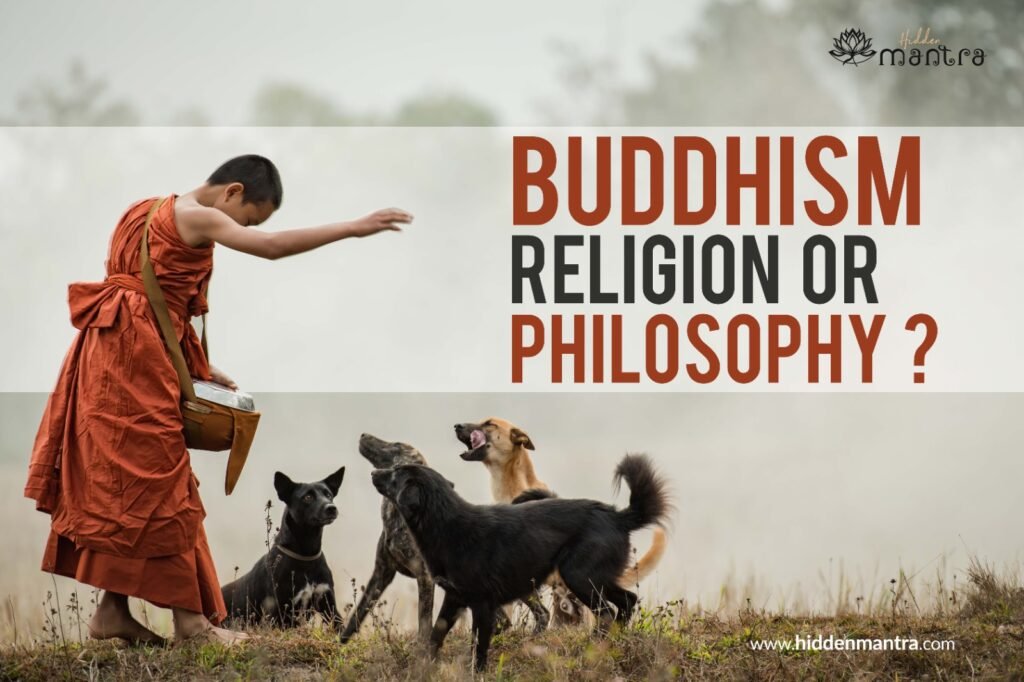Table of Contents
ToggleBuddhism, a valid system of spiritual teachings and practices, emerged 2,500 years ago. Consist of more than 535 million followers today, which leads up to 7% of the global population. Is Buddhism religion or philosophy ? It is a common doubt in today’s world .
Some view Buddhism as a religion with rituals, faith, and devotion, while others see it as a philosophy focused on mindfulness and practical wisdom. This difference arises because Buddhism blends spiritual practices and life principles. Let’s see how it classifies between belief and practice
The teachings, rooted in the life and wisdom of Siddhartha Gautama later known as Buddha offer guidance on attaining enlightenment and inner peace.
Is Buddhism a Religion?
Buddhism states a profound debate over the statement as whether it is a religion? The comprised philosophical depth, dedicating on Personal transformation, diverging from traditional theistic elements make it more unique. Let’s get more info on it
Definition of Religion and Alignment with Buddhism
Religion focuses on more divinity, beliefs and practices of the particular community that also follows the unique rituals of own. Moral codes and customs embrace the divine power. Buddhism also shares many of these attributes
- Sacred Teachings
Buddhism evolves around the teachings of Buddha which aim to hold suffering and achieve enlightenment, E.g. Four Noble Truths and the Eightfold Path - Ethical Guidelines
Like many religions, it provides a moral entity, such as the Five Precepts, which guide personal behavior and evolve harmony.
Buddhism lacks a belief on creator deity, instead focus on personal experience, karma and rebirth.
Practices: Rituals, Ceremonies, and Faith
Buddhism incorporates various rituals and ceremonies, particularly in its Mahayana and Vajrayana traditions. Examples include:
- Meditation Practices: Meditation act as the best tool for self-awareness and enlightenment.
- Ceremonial Offerings: Rituals practiced in temples such as lighting candles, and offering flowers which symbolizing devotion.
- Faith in Teachings: Practitioners often hold deep console and faith in the Buddha’s teachings and the monastic community.
This combination of practice and faith equalize the structures found in other religions, though it remains on individual practice and liberation.
The Role of Temples, Monks, and Community
As like in other religion, Buddhism also have elements like Temples, Monks and Community which diverts the arguments.
- Temples: Central to Buddhist practice, temples serve as spaces for worship, meditation, and learning.
- Monks and Nuns: The monastic Sangha embodies Buddhism’s core teachings and acts as spiritual guides for Lay followers.
- Community: Lay practitioners form a vital part of the Buddhist Sangha, participating in rituals, learning from monks, and supporting temples.
The interconnectedness of these elements reflets religious institutions in other faiths.
Lack of a Creator God and Buddhism’s Unique Stance
One of Buddhism’s defining features is its no creator approach. Propelling more on actions, This absence of a deity leads some to categorize Buddhism as a philosophy or way of life rather than a religion.
Is Buddhism a Philosophy?
Buddhism is often regarded as a philosophy due to its practical teachings and rational approach to understanding life and existence. Its aims on personal experience, ethical living, and mindfulness aligns closely with philosophical practices.
Philosophy as a Way of Life or Worldview
Philosophy is traditionally seen as a quest for wisdom, focusing on questions about existence. Buddhism aligns seamlessly with this definition:
- Practical Wisdom: The Buddha’s teachings reduce suffering and attains enlightenment, which praises as a practical involvement for living.
- Worldview: Buddhism offers a different perspective on life, includes the principles of non-permanence, non-self, and the interconnectedness.
Buddhism encourages to examine personal experiences and apply its principles to their lives.
Focus on Ethics, Mindfulness, and Wisdom
Key philosophical themes in Buddhism include
- Ethics: The Five elements guide ethical living, involving non-violence, honesty, and compassion. These principles seasons as a foundation for personal harmony.
- Mindfulness: Mindfulness cultivates awareness of the present moment, giving clarity and insight into the reality.
- Wisdom: Buddhism promotes wisdom as the ultimate goal. It is activated through meditation, self-reflection, and understanding the causes of suffering.
These elements underscore Buddhism’s philosophical orientation and elevate the Theoretical practices
Teachings Like the Four Noble Truths and the Eightfold Path
The Buddha’s core teachings represent a systematic approach to understanding and addressing human suffering.
- The Four Noble Truths
- Life involves suffering (Dukkha).
- Suffering has a cause (craving or attachment).
- Suffering can be overcome (through Nirvana).
- The Eightfold Path is the means to achieve liberation.
- The Eightfold Path
This framework emphasis on e ethical conduct, mental discipline, and wisdom, guiding individuals toward a balanced and enlightened way of living.
These teachings emphasize rational analysis and experiential validation, reflecting a philosophical methodology rather than faith.
The Scientific Appeal and Rationality of its Practices
Buddhism’s rational and experiential nature has drawn comparisons to scientific inquiry
- Empirical Focus: The Buddha encouraged his practitioners to test the teachings through own experimental experiences, as it involves scientific method relies on observation and experimentation.
- Mind-Body Research: Meditation benefits in reducing stress, improving mental health, and enhancing body functions.
- Absence of Dogma: Unlike traditional religions, Buddhism does not demand to unverifiable beliefs, emphasizing evidence instead.
This scientific and rational appeal strengthens Buddhism as a philosophy.
Conclusion
Buddhism is a phase of simple categorisation. Its emphasis on ethics, mindfulness, and rational understanding positions it as philosophy of life. Buddhism always defuses clarity over the boundaries between religion and philosophy.
Whether some views it as a religion, philosophy, or both, Buddhism’s lies in its profound insights into the human condition and its transformative practices. Involving more topic on Buddhism and buddha quotes, hidden mantra and hidden mantra are the best space to earn the knowledge. Do follow hidden mantra blogs for more related contents. Namaste
Also Read: How Buddhist Philosophy Align with Western Psychology ?







